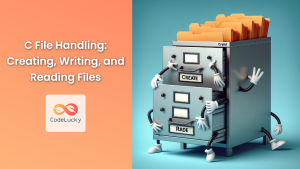The C programming language is renowned for its efficiency and power, and much of this comes from its extensive standard library. One of the most frequently used headers in C is <stdio.h>, which provides essential input/output operations. In this comprehensive guide, we'll dive deep into the world of <stdio.h>, exploring its most important functions and demonstrating their practical applications with detailed examples.
Introduction to
The <stdio.h> header is a cornerstone of C programming, offering a wide array of functions for input and output operations. Whether you're reading from the keyboard, writing to the screen, or manipulating files, <stdio.h> has you covered. Let's explore some of its most crucial functions.
printf(): Formatted Output
The printf() function is arguably the most commonly used function in C programming. It allows you to output formatted text to the console.
Basic Usage
#include <stdio.h>
int main() {
printf("Hello, World!\n");
return 0;
}
This simple program outputs "Hello, World!" to the console.
Formatting Options
printf() really shines when it comes to formatting. Here's a more complex example:
#include <stdio.h>
int main() {
int age = 30;
float height = 1.75;
char name[] = "John Doe";
printf("Name: %s\nAge: %d\nHeight: %.2f meters\n", name, age, height);
return 0;
}
Output:
Name: John Doe
Age: 30
Height: 1.75 meters
In this example, we use format specifiers:
%sfor strings%dfor integers%.2ffor floating-point numbers (with 2 decimal places)
📌 Pro Tip: Use %zu for size_t types, which is especially useful when working with array sizes or memory allocations.
scanf(): Formatted Input
While printf() handles output, scanf() is used for input. It reads formatted input from the standard input stream (usually the keyboard).
#include <stdio.h>
int main() {
int age;
char name[50];
printf("Enter your name: ");
scanf("%49s", name); // Limit input to 49 characters to prevent buffer overflow
printf("Enter your age: ");
scanf("%d", &age);
printf("Hello, %s! You are %d years old.\n", name, age);
return 0;
}
Sample run:
Enter your name: Alice
Enter your age: 25
Hello, Alice! You are 25 years old.
⚠️ Warning: Be cautious when using scanf() with strings. Always specify a maximum field width to prevent buffer overflows.
fgets(): Safe String Input
For safer string input, especially when you need to read entire lines including spaces, fgets() is preferred over scanf().
#include <stdio.h>
#include <string.h>
int main() {
char fullName[100];
printf("Enter your full name: ");
fgets(fullName, sizeof(fullName), stdin);
// Remove trailing newline if present
fullName[strcspn(fullName, "\n")] = 0;
printf("Hello, %s!\n", fullName);
return 0;
}
Sample run:
Enter your full name: John Smith
Hello, John Smith!
🔍 Note: fgets() reads until a newline is encountered or the buffer is full, whichever comes first. It includes the newline in the string if there's room, which is why we remove it in the example.
File Operations
<stdio.h> provides powerful functions for file handling. Let's look at some common operations.
fopen(): Opening a File
#include <stdio.h>
int main() {
FILE *file = fopen("example.txt", "w");
if (file == NULL) {
printf("Error opening file!\n");
return 1;
}
fprintf(file, "Hello, File!\n");
fclose(file);
return 0;
}
This program opens a file named "example.txt" in write mode, writes a string to it, and then closes the file.
fread() and fwrite(): Binary I/O
These functions are used for reading from and writing to binary files.
#include <stdio.h>
struct Person {
char name[50];
int age;
};
int main() {
struct Person people[] = {
{"Alice", 30},
{"Bob", 25},
{"Charlie", 35}
};
// Writing to a binary file
FILE *file = fopen("people.bin", "wb");
if (file == NULL) {
printf("Error opening file for writing!\n");
return 1;
}
fwrite(people, sizeof(struct Person), 3, file);
fclose(file);
// Reading from the binary file
struct Person readPeople[3];
file = fopen("people.bin", "rb");
if (file == NULL) {
printf("Error opening file for reading!\n");
return 1;
}
fread(readPeople, sizeof(struct Person), 3, file);
fclose(file);
// Printing the read data
for (int i = 0; i < 3; i++) {
printf("Name: %s, Age: %d\n", readPeople[i].name, readPeople[i].age);
}
return 0;
}
Output:
Name: Alice, Age: 30
Name: Bob, Age: 25
Name: Charlie, Age: 35
This example demonstrates writing structured data to a binary file and then reading it back.
Advanced File Operations
fseek(): File Positioning
fseek() allows you to move the file position indicator to a specific location within a file.
#include <stdio.h>
int main() {
FILE *file = fopen("numbers.txt", "w+");
if (file == NULL) {
printf("Error opening file!\n");
return 1;
}
// Write numbers to the file
for (int i = 1; i <= 5; i++) {
fprintf(file, "%d\n", i);
}
// Move to the beginning of the file
fseek(file, 0, SEEK_SET);
// Read and print the third number
char buffer[10];
fseek(file, 4, SEEK_SET); // Move to the start of the third line
fgets(buffer, sizeof(buffer), file);
printf("The third number is: %s", buffer);
fclose(file);
return 0;
}
Output:
The third number is: 3
This program writes numbers to a file, then uses fseek() to move to a specific position and read a particular number.
Error Handling with perror()
The perror() function is useful for printing descriptive error messages.
#include <stdio.h>
#include <errno.h>
int main() {
FILE *file = fopen("nonexistent.txt", "r");
if (file == NULL) {
perror("Error opening file");
return 1;
}
// File operations would go here if the file was successfully opened
fclose(file);
return 0;
}
Possible output:
Error opening file: No such file or directory
perror() prints the string you provide, followed by a colon and the error message corresponding to the current value of errno.
Buffering with setvbuf()
setvbuf() allows you to control how output is buffered.
#include <stdio.h>
int main() {
// Set stdout to be unbuffered
if (setvbuf(stdout, NULL, _IONBF, 0) != 0) {
printf("Error setting buffer\n");
return 1;
}
printf("This will be printed immediately.\n");
// Normal buffered output for comparison
fprintf(stderr, "This might be printed immediately too.\n");
return 0;
}
This example sets stdout to be unbuffered, meaning each character is written as soon as it's output.
Temporary Files with tmpfile()
tmpfile() creates a temporary file that is automatically deleted when it's closed or when the program exits.
#include <stdio.h>
int main() {
FILE *tempFile = tmpfile();
if (tempFile == NULL) {
perror("Error creating temporary file");
return 1;
}
fprintf(tempFile, "This is a temporary file.\n");
// Move to the beginning of the file
rewind(tempFile);
// Read and print the contents
char buffer[100];
while (fgets(buffer, sizeof(buffer), tempFile) != NULL) {
printf("%s", buffer);
}
fclose(tempFile);
return 0;
}
Output:
This is a temporary file.
This program creates a temporary file, writes to it, reads from it, and then closes it, after which the file is automatically deleted.
Conclusion
The <stdio.h> header in C provides a robust set of functions for input/output operations, from simple console I/O to complex file manipulations. By mastering these functions, you'll be well-equipped to handle a wide range of programming tasks in C.
Remember, while <stdio.h> is powerful, it's important to use its functions carefully, especially when dealing with user input or file operations. Always check for errors, handle them appropriately, and be mindful of buffer sizes to write secure and reliable C programs.
🚀 Challenge: Try combining multiple <stdio.h> functions to create a simple text-based data management system. This could involve reading user input, writing to files, and reading from files to display information.
By leveraging the power of <stdio.h>, you can create efficient, robust C programs capable of handling complex I/O operations with ease. Happy coding!



















